Delegation of Patient Care in Hospitals: RN and UAP Roles
VerifiedAdded on 2022/11/28
|5
|1345
|465
Essay
AI Summary
This essay delves into the critical topic of delegation in nursing practice, specifically within the hospital environment. It examines the roles and responsibilities of registered nurses (RNs) and unlicensed assistive personnel (UAPs), drawing upon the perspective of the State Board of Nursing in California. The essay clarifies the scope of practice for UAPs, emphasizing that they work under the supervision of RNs, performing tasks delegated to them. It outlines the responsibilities of RNs in initiating healthcare practices, managing patient records, administering medications, and evaluating patients. The essay further discusses the factors RNs must consider when delegating tasks, including the scope of nursing practice, the capabilities of the UAP, and the criticality of patient care. It highlights the differences in responsibilities between RNs and UAPs, particularly in intensive care units (ICUs), where UAPs are restricted to specific actions under strict supervision. The essay concludes by emphasizing the distinct roles of RNs and UAPs in providing patient care.
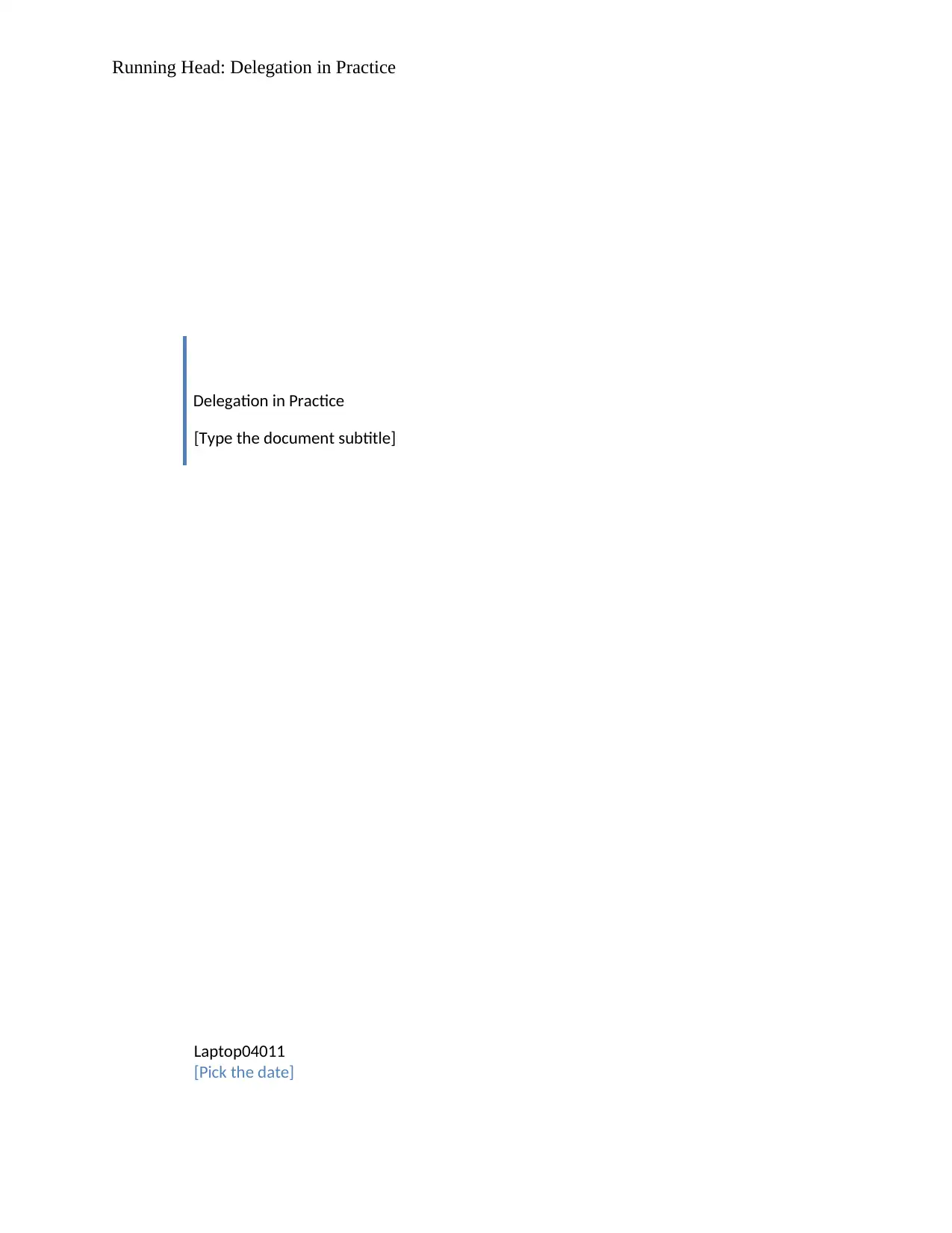
Running Head: Delegation in Practice
Delegation in Practice
[Type the document subtitle]
Laptop04011
[Pick the date]
Delegation in Practice
[Type the document subtitle]
Laptop04011
[Pick the date]
Paraphrase This Document
Need a fresh take? Get an instant paraphrase of this document with our AI Paraphraser
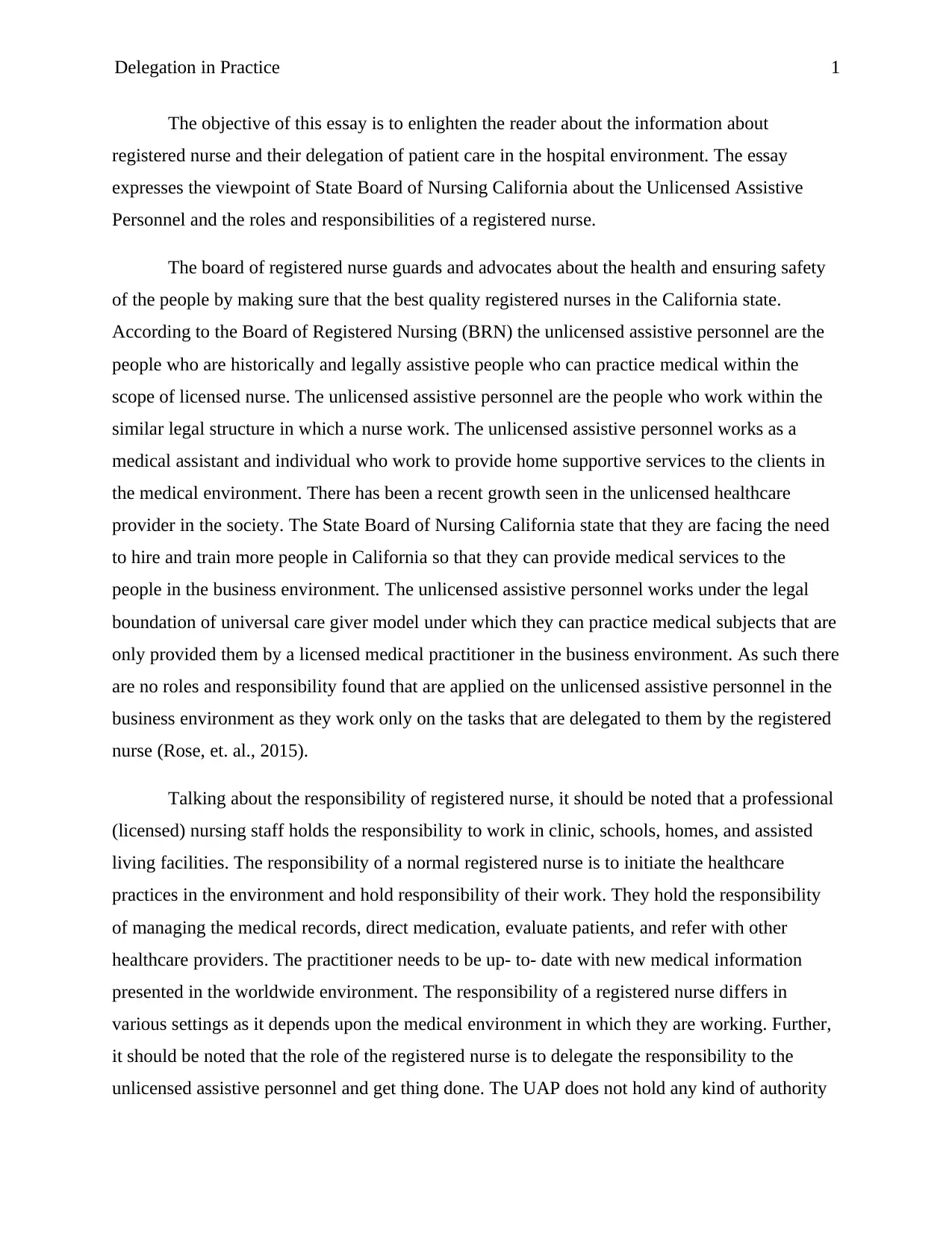
Delegation in Practice 1
The objective of this essay is to enlighten the reader about the information about
registered nurse and their delegation of patient care in the hospital environment. The essay
expresses the viewpoint of State Board of Nursing California about the Unlicensed Assistive
Personnel and the roles and responsibilities of a registered nurse.
The board of registered nurse guards and advocates about the health and ensuring safety
of the people by making sure that the best quality registered nurses in the California state.
According to the Board of Registered Nursing (BRN) the unlicensed assistive personnel are the
people who are historically and legally assistive people who can practice medical within the
scope of licensed nurse. The unlicensed assistive personnel are the people who work within the
similar legal structure in which a nurse work. The unlicensed assistive personnel works as a
medical assistant and individual who work to provide home supportive services to the clients in
the medical environment. There has been a recent growth seen in the unlicensed healthcare
provider in the society. The State Board of Nursing California state that they are facing the need
to hire and train more people in California so that they can provide medical services to the
people in the business environment. The unlicensed assistive personnel works under the legal
boundation of universal care giver model under which they can practice medical subjects that are
only provided them by a licensed medical practitioner in the business environment. As such there
are no roles and responsibility found that are applied on the unlicensed assistive personnel in the
business environment as they work only on the tasks that are delegated to them by the registered
nurse (Rose, et. al., 2015).
Talking about the responsibility of registered nurse, it should be noted that a professional
(licensed) nursing staff holds the responsibility to work in clinic, schools, homes, and assisted
living facilities. The responsibility of a normal registered nurse is to initiate the healthcare
practices in the environment and hold responsibility of their work. They hold the responsibility
of managing the medical records, direct medication, evaluate patients, and refer with other
healthcare providers. The practitioner needs to be up- to- date with new medical information
presented in the worldwide environment. The responsibility of a registered nurse differs in
various settings as it depends upon the medical environment in which they are working. Further,
it should be noted that the role of the registered nurse is to delegate the responsibility to the
unlicensed assistive personnel and get thing done. The UAP does not hold any kind of authority
The objective of this essay is to enlighten the reader about the information about
registered nurse and their delegation of patient care in the hospital environment. The essay
expresses the viewpoint of State Board of Nursing California about the Unlicensed Assistive
Personnel and the roles and responsibilities of a registered nurse.
The board of registered nurse guards and advocates about the health and ensuring safety
of the people by making sure that the best quality registered nurses in the California state.
According to the Board of Registered Nursing (BRN) the unlicensed assistive personnel are the
people who are historically and legally assistive people who can practice medical within the
scope of licensed nurse. The unlicensed assistive personnel are the people who work within the
similar legal structure in which a nurse work. The unlicensed assistive personnel works as a
medical assistant and individual who work to provide home supportive services to the clients in
the medical environment. There has been a recent growth seen in the unlicensed healthcare
provider in the society. The State Board of Nursing California state that they are facing the need
to hire and train more people in California so that they can provide medical services to the
people in the business environment. The unlicensed assistive personnel works under the legal
boundation of universal care giver model under which they can practice medical subjects that are
only provided them by a licensed medical practitioner in the business environment. As such there
are no roles and responsibility found that are applied on the unlicensed assistive personnel in the
business environment as they work only on the tasks that are delegated to them by the registered
nurse (Rose, et. al., 2015).
Talking about the responsibility of registered nurse, it should be noted that a professional
(licensed) nursing staff holds the responsibility to work in clinic, schools, homes, and assisted
living facilities. The responsibility of a normal registered nurse is to initiate the healthcare
practices in the environment and hold responsibility of their work. They hold the responsibility
of managing the medical records, direct medication, evaluate patients, and refer with other
healthcare providers. The practitioner needs to be up- to- date with new medical information
presented in the worldwide environment. The responsibility of a registered nurse differs in
various settings as it depends upon the medical environment in which they are working. Further,
it should be noted that the role of the registered nurse is to delegate the responsibility to the
unlicensed assistive personnel and get thing done. The UAP does not hold any kind of authority
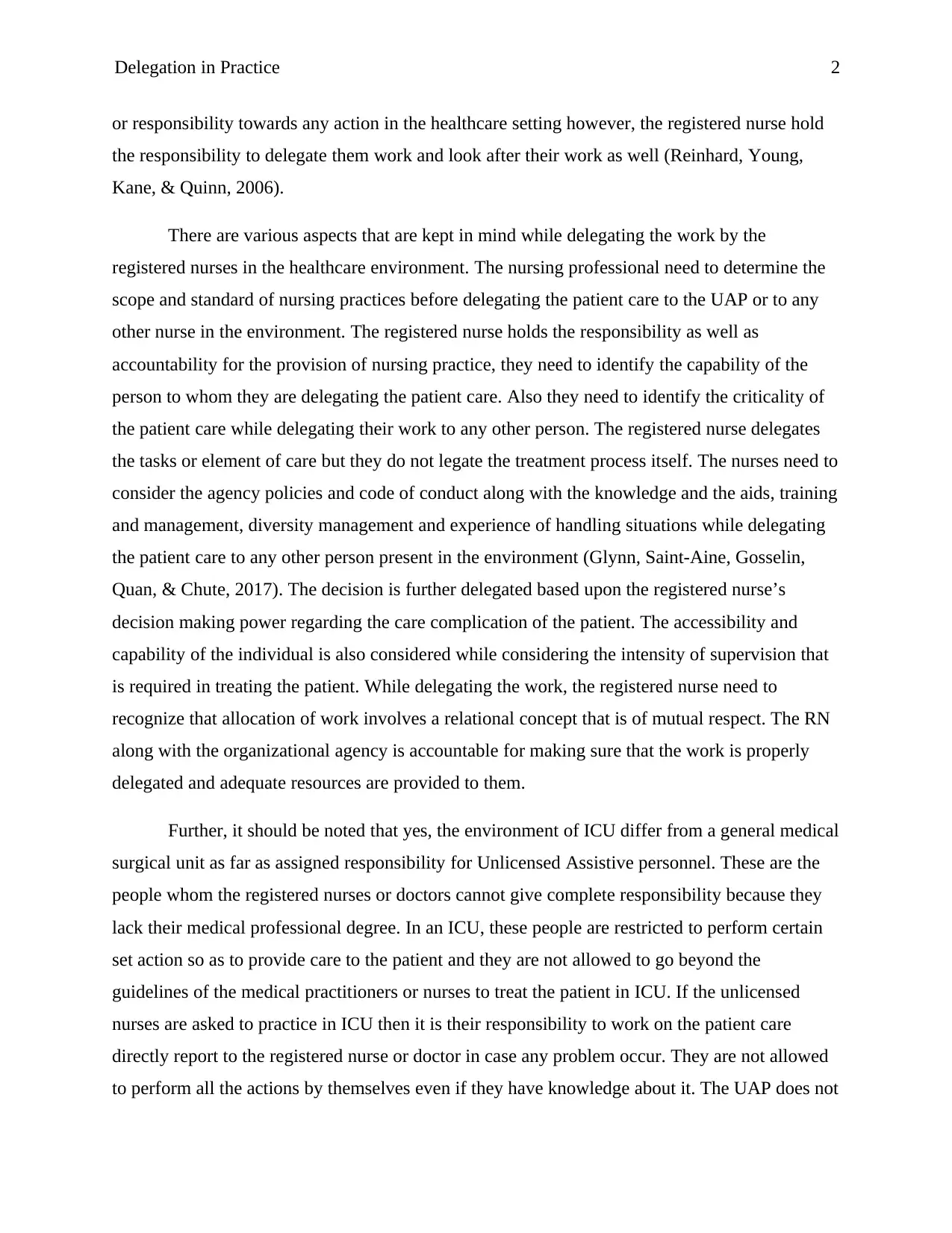
Delegation in Practice 2
or responsibility towards any action in the healthcare setting however, the registered nurse hold
the responsibility to delegate them work and look after their work as well (Reinhard, Young,
Kane, & Quinn, 2006).
There are various aspects that are kept in mind while delegating the work by the
registered nurses in the healthcare environment. The nursing professional need to determine the
scope and standard of nursing practices before delegating the patient care to the UAP or to any
other nurse in the environment. The registered nurse holds the responsibility as well as
accountability for the provision of nursing practice, they need to identify the capability of the
person to whom they are delegating the patient care. Also they need to identify the criticality of
the patient care while delegating their work to any other person. The registered nurse delegates
the tasks or element of care but they do not legate the treatment process itself. The nurses need to
consider the agency policies and code of conduct along with the knowledge and the aids, training
and management, diversity management and experience of handling situations while delegating
the patient care to any other person present in the environment (Glynn, Saint-Aine, Gosselin,
Quan, & Chute, 2017). The decision is further delegated based upon the registered nurse’s
decision making power regarding the care complication of the patient. The accessibility and
capability of the individual is also considered while considering the intensity of supervision that
is required in treating the patient. While delegating the work, the registered nurse need to
recognize that allocation of work involves a relational concept that is of mutual respect. The RN
along with the organizational agency is accountable for making sure that the work is properly
delegated and adequate resources are provided to them.
Further, it should be noted that yes, the environment of ICU differ from a general medical
surgical unit as far as assigned responsibility for Unlicensed Assistive personnel. These are the
people whom the registered nurses or doctors cannot give complete responsibility because they
lack their medical professional degree. In an ICU, these people are restricted to perform certain
set action so as to provide care to the patient and they are not allowed to go beyond the
guidelines of the medical practitioners or nurses to treat the patient in ICU. If the unlicensed
nurses are asked to practice in ICU then it is their responsibility to work on the patient care
directly report to the registered nurse or doctor in case any problem occur. They are not allowed
to perform all the actions by themselves even if they have knowledge about it. The UAP does not
or responsibility towards any action in the healthcare setting however, the registered nurse hold
the responsibility to delegate them work and look after their work as well (Reinhard, Young,
Kane, & Quinn, 2006).
There are various aspects that are kept in mind while delegating the work by the
registered nurses in the healthcare environment. The nursing professional need to determine the
scope and standard of nursing practices before delegating the patient care to the UAP or to any
other nurse in the environment. The registered nurse holds the responsibility as well as
accountability for the provision of nursing practice, they need to identify the capability of the
person to whom they are delegating the patient care. Also they need to identify the criticality of
the patient care while delegating their work to any other person. The registered nurse delegates
the tasks or element of care but they do not legate the treatment process itself. The nurses need to
consider the agency policies and code of conduct along with the knowledge and the aids, training
and management, diversity management and experience of handling situations while delegating
the patient care to any other person present in the environment (Glynn, Saint-Aine, Gosselin,
Quan, & Chute, 2017). The decision is further delegated based upon the registered nurse’s
decision making power regarding the care complication of the patient. The accessibility and
capability of the individual is also considered while considering the intensity of supervision that
is required in treating the patient. While delegating the work, the registered nurse need to
recognize that allocation of work involves a relational concept that is of mutual respect. The RN
along with the organizational agency is accountable for making sure that the work is properly
delegated and adequate resources are provided to them.
Further, it should be noted that yes, the environment of ICU differ from a general medical
surgical unit as far as assigned responsibility for Unlicensed Assistive personnel. These are the
people whom the registered nurses or doctors cannot give complete responsibility because they
lack their medical professional degree. In an ICU, these people are restricted to perform certain
set action so as to provide care to the patient and they are not allowed to go beyond the
guidelines of the medical practitioners or nurses to treat the patient in ICU. If the unlicensed
nurses are asked to practice in ICU then it is their responsibility to work on the patient care
directly report to the registered nurse or doctor in case any problem occur. They are not allowed
to perform all the actions by themselves even if they have knowledge about it. The UAP does not
⊘ This is a preview!⊘
Do you want full access?
Subscribe today to unlock all pages.

Trusted by 1+ million students worldwide
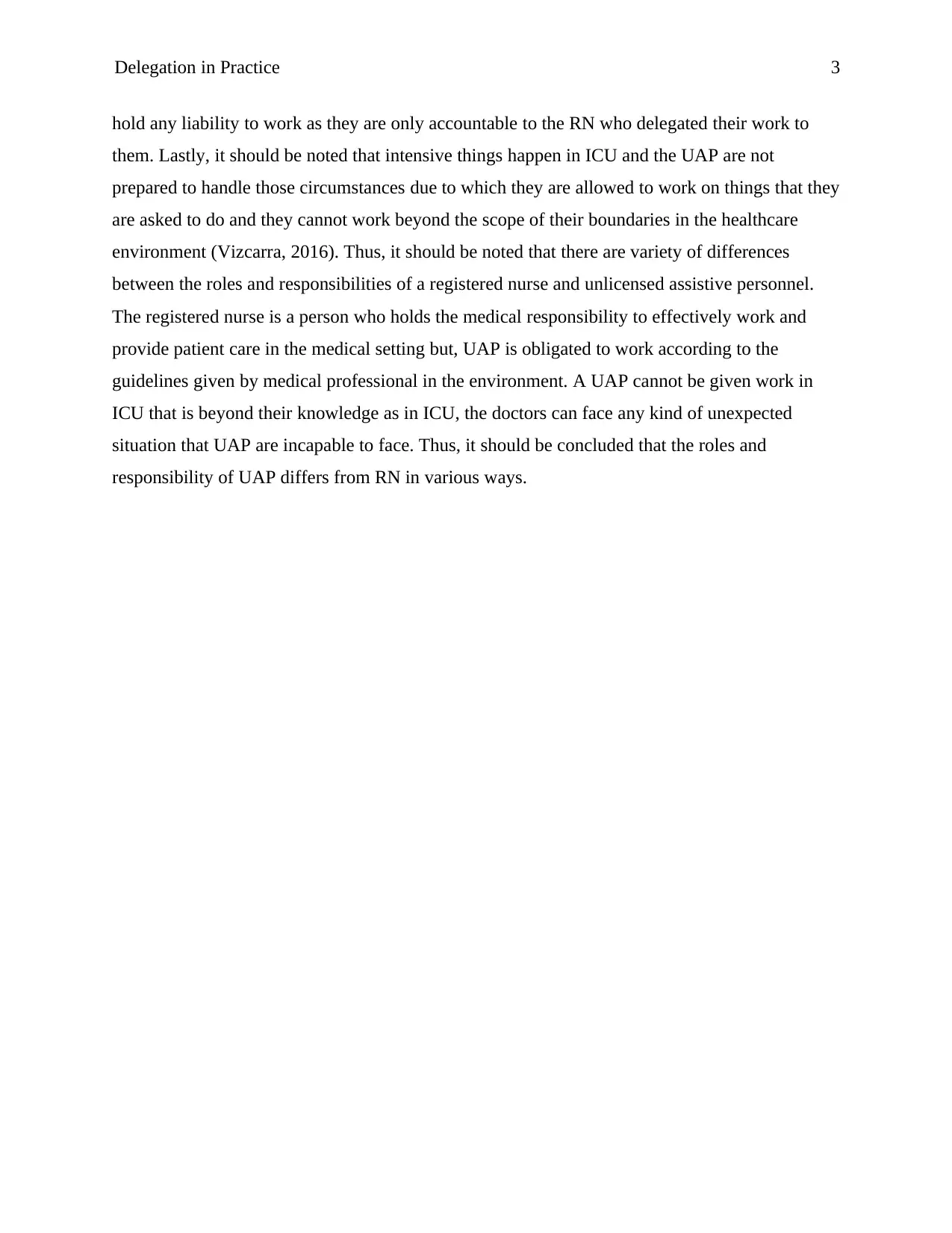
Delegation in Practice 3
hold any liability to work as they are only accountable to the RN who delegated their work to
them. Lastly, it should be noted that intensive things happen in ICU and the UAP are not
prepared to handle those circumstances due to which they are allowed to work on things that they
are asked to do and they cannot work beyond the scope of their boundaries in the healthcare
environment (Vizcarra, 2016). Thus, it should be noted that there are variety of differences
between the roles and responsibilities of a registered nurse and unlicensed assistive personnel.
The registered nurse is a person who holds the medical responsibility to effectively work and
provide patient care in the medical setting but, UAP is obligated to work according to the
guidelines given by medical professional in the environment. A UAP cannot be given work in
ICU that is beyond their knowledge as in ICU, the doctors can face any kind of unexpected
situation that UAP are incapable to face. Thus, it should be concluded that the roles and
responsibility of UAP differs from RN in various ways.
hold any liability to work as they are only accountable to the RN who delegated their work to
them. Lastly, it should be noted that intensive things happen in ICU and the UAP are not
prepared to handle those circumstances due to which they are allowed to work on things that they
are asked to do and they cannot work beyond the scope of their boundaries in the healthcare
environment (Vizcarra, 2016). Thus, it should be noted that there are variety of differences
between the roles and responsibilities of a registered nurse and unlicensed assistive personnel.
The registered nurse is a person who holds the medical responsibility to effectively work and
provide patient care in the medical setting but, UAP is obligated to work according to the
guidelines given by medical professional in the environment. A UAP cannot be given work in
ICU that is beyond their knowledge as in ICU, the doctors can face any kind of unexpected
situation that UAP are incapable to face. Thus, it should be concluded that the roles and
responsibility of UAP differs from RN in various ways.
Paraphrase This Document
Need a fresh take? Get an instant paraphrase of this document with our AI Paraphraser
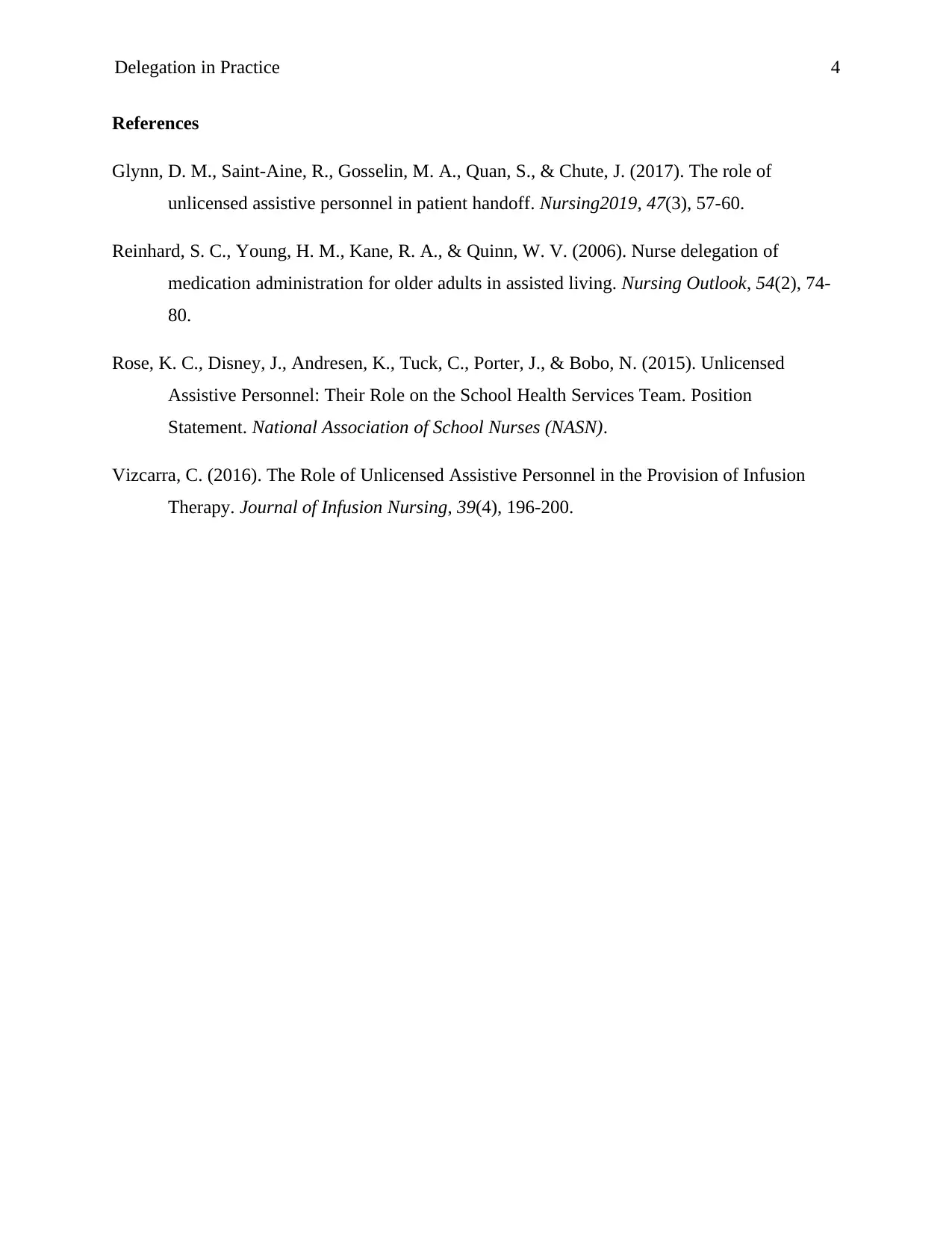
Delegation in Practice 4
References
Glynn, D. M., Saint-Aine, R., Gosselin, M. A., Quan, S., & Chute, J. (2017). The role of
unlicensed assistive personnel in patient handoff. Nursing2019, 47(3), 57-60.
Reinhard, S. C., Young, H. M., Kane, R. A., & Quinn, W. V. (2006). Nurse delegation of
medication administration for older adults in assisted living. Nursing Outlook, 54(2), 74-
80.
Rose, K. C., Disney, J., Andresen, K., Tuck, C., Porter, J., & Bobo, N. (2015). Unlicensed
Assistive Personnel: Their Role on the School Health Services Team. Position
Statement. National Association of School Nurses (NASN).
Vizcarra, C. (2016). The Role of Unlicensed Assistive Personnel in the Provision of Infusion
Therapy. Journal of Infusion Nursing, 39(4), 196-200.
References
Glynn, D. M., Saint-Aine, R., Gosselin, M. A., Quan, S., & Chute, J. (2017). The role of
unlicensed assistive personnel in patient handoff. Nursing2019, 47(3), 57-60.
Reinhard, S. C., Young, H. M., Kane, R. A., & Quinn, W. V. (2006). Nurse delegation of
medication administration for older adults in assisted living. Nursing Outlook, 54(2), 74-
80.
Rose, K. C., Disney, J., Andresen, K., Tuck, C., Porter, J., & Bobo, N. (2015). Unlicensed
Assistive Personnel: Their Role on the School Health Services Team. Position
Statement. National Association of School Nurses (NASN).
Vizcarra, C. (2016). The Role of Unlicensed Assistive Personnel in the Provision of Infusion
Therapy. Journal of Infusion Nursing, 39(4), 196-200.
1 out of 5
Related Documents
Your All-in-One AI-Powered Toolkit for Academic Success.
+13062052269
info@desklib.com
Available 24*7 on WhatsApp / Email
![[object Object]](/_next/static/media/star-bottom.7253800d.svg)
Unlock your academic potential
Copyright © 2020–2026 A2Z Services. All Rights Reserved. Developed and managed by ZUCOL.





